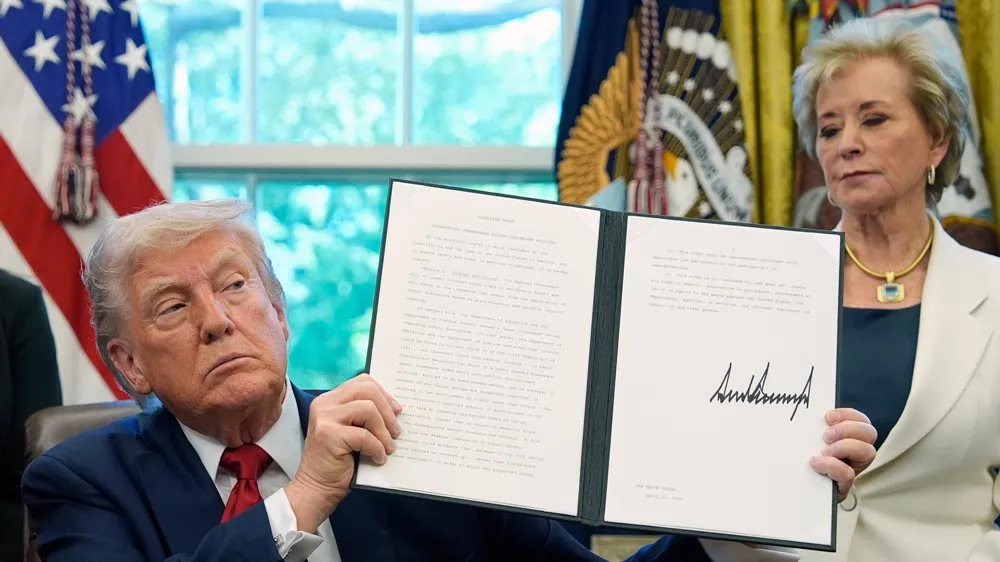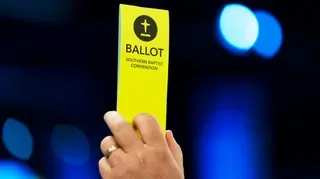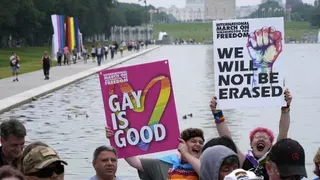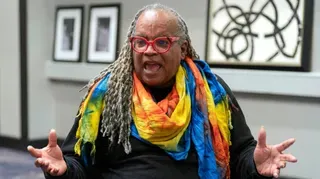June 15, 2010
Gay-Positive French McDonald's Ad Won't Air in U.S.
Kilian Melloy READ TIME: 6 MIN.
A McDonald's ad showing a gay teenage boy and his father getting ready to eat lunch at one of the chain's restaurants tells patrons to "Venez comme vous etes," or, in plain English, "Come As You Are." But the ad won't be coming to America.
In a June 13 interview with the Chicago Tribune, McDonald's operations chief Don Thompson agreed that the ad had provoked controversy, and said that it would not be aired in the U.S. The controversy has been in the United States, however, and not in France, where the ad has played.
The Chicago Tribune noted that, "A French TV ad featuring a gay teen and his father has stirred some controversy - not there, but here," and asked Thompson, "Can you talk about that?"
"It is an example that markets, cultures are very different around the world," said Thompson, who then went on to mention his own religious beliefs. "I've never shied away from the fact that I'm a Christian," said Thompson. "I have my own personal beliefs and I don't impose those on anybody else."
Thompson went on to note that religious traditions and cultural sensitivities are different from culture to culture, before adding that McDonald's--which is a worldwide brand--had a set a "core values, and the world is getting much closer." Thompson said that there were "conversations" about "things that may have an implication in one part of the world and may be the cultural norm in another part of the world. And those are things that, yes, we're going to learn from. But, you're right, that commercial won't show in the United States." Thompson went on to acknowledge that, "there have been no negatives coming out of France" with respect to the ad.
But globally, the video has become a viral Internet sensation, reported Canadian media company Canwest News Service. Within a week of its YouTube debut, the video had scored over half a million hits online. McDonald's spokesperson Nathalie Legarlantezec stated, "We wanted to show society the way it is today, without judging: there's obviously no problem with homosexuality in France today."
Though the ad has yet to air outside of France, the executive director of the Canadian equality group EGALE, Helen Kennedy, praised the spot, saying, "It's very encouraging for gay youth to see themselves reflected in such mainstream media." Added Kennedy, "It's great that McDonald's is putting it out there, and kudos to the creative team. It's certainly a step in the right direction."
At Marketwatch.com, Thomas Kostigen wrote in his June 4 Ethics Watch column that the move's reflection of "inclusive advertising" was as step in the right direction for a host of reasons.
"Companies should advertise to reach the largest number of customers for their products," Kostigen write. "Sexual orientation should just be another demographic in the mix, and just as with all the other groups, advertising should be done well. Yet there is a larger social responsibility when dealing with certain groups and minorities; a bigger, positive message can be had."
Kostigen went on to write that, "it's important for companies to think beyond the aspect of commercialism and see the larger social benefit in advertising to, and hopefully attracting more customers based on minority status: they are in a subtle, powerful and effective way saying: 'It's OK who you are. You are welcome here.' " Added the columnist, "That is why the McDonald's advertisement in France is so important. It does the opposite of what most ads try to do. Instead of trying to make people believe that they are unique, it's saying that they aren't."
Kostigen offered a personal opinion on the issue of homosexuality, writing, "I don't particularly know why there is such a fascination about gayness, but there is. My own personal opinion about the subject is: who cares?"
Activist Wayne Besen, founder of Truth Wins Out, a group dedicated to countering the claims of religiously-based "reparative therapy" programs touting a "cure" for gays, offered something of an answer to the question raised in Kostigen's column. In the June 8 edition of his own column, Besen wrote, "Normal, healthy, functional heterosexuals do not become paranoid or fixated on homosexuals. It is primarily people with sexual hang-ups, extreme religious indoctrination or deep, dark secrets that are preoccupied and consumed by the sexual orientation of others."
For his column, Besen cited still another columnist, Charles Blow of the New York Times, who wrote, "Virulent homophobes are increasingly being exposed for engaging in homosexuality. Many heterosexual men see this, and they don't want to be associated with it. It's like being antigay is becoming the old gay. Not cool."
The subject of Blow's column, noted Besen, was a recent Gallup poll that showed that for the first time, a majority of Americans morally accept "gay and lesbian relations." Besen suggested that this indicated that a "tipping point" for GLBT equality had been reached. Part of that sea change, Besen wrote, has come about through the use of social networking, which allows people to broadcast the minutiae of their personal lives. As visibility grows, so does acceptance; and as for the so-called "ick factor," which had been credited with evoking a visceral sense of disgust in voters when gay issues are put before them, Besen wrote that it was still true that many people who support GLBT equality don't want to think about the mechanics of gay sex. By the same token, however, Besen points out that gay sex is only an issue because it has been artificially made the focus of many legal debates. Few people relish the prospect of thinking about the sex lives of heterosexuals, either.
"While speaking across the nation I have found an easy way of diffusing this issue," Besen writes in his column. "I ask the crowd to look at people they assume are heterosexual in the audience. Then, I ask if they would want to see all of the people they stared at having sexual intercourse." Recounts Besen, "The answer is inevitably and resoundingly, 'No'. Then, I simply make the point that there are many people, heterosexual and homosexual, they would not want to witness in bed." Notes Besen, "As simple as this sounds, it works and audiences 'get it.' "
Added Besen, "Sure, full legal equality may take two decades and the battle against bigotry will last forever. But, there is no denying that the LGBT movement is on the move like never before. The homophobes are finally the minority and appearing more secluded and deluded by the day."
Although there are no plans to air the ad in the United States, anti-gay American pundits have jumped on the ad, with online conservative news site CNS reporting on the ad on June 4. The article said that CNS had contacted McDonald's to demand an explanation, and received the response that the ad is part of a series of themed spots ("Come As You Are"). The article then relayed commentary from the Family Research Council's Peter Sprigg, who said of the ad, "It struck me as strange. Did homosexuals not feel welcomed at McDonald's in France already?" Added Sprigg, "It's sort of a gratuitous effort to ingratiate themselves with homosexual activists and, in that sense, it's saddening and disheartening for those of us who hold to traditional values."
An article at media watchdog site ConWebBlog took CNS to task for the story in a June 7 article. "CNS was among the cheerleaders when the American Family Association led a boycott against McDonald's for the offense of contributing $20,000 to the National Gay and Lesbian Chamber of Commerce," recalled the ConWebBlog item. "CNS uncritically reported AFA president Tim Wildmon's claim that the NGLCC 'even push legislation, so obviously they're for same-sex marriage'--even though, as we detailed at the time, there was no evidence the NGLCC had ever lobbied for same-sex marriage. CNS also repeated numerous other attacks on McDonald's over the issue.
Upon McDonald's withdrawing from the NGLCC, the article said, the president of the FRC, Tony Perkins, declared victory, saying, "The Big Mac attack on family values is finally over. After a five-month boycott, Americans finally got what they ordered--McDonald's agreement to stop financing the homosexual agenda."
The Family Research Council has been in the news recently due to the revelation that one of its co-founders, George Rekers, a professional witness in at least two challenges to anti-gay state laws and a longtime anti-gay activist, hired a 20-year-old male escort to accompany him on a European vacation. The escort described for the media the sexual massages he gave Rekers.
Fox News host Bill O'Reilly angered GLBT equality advocates when he compared gays to terrorists while speaking to a correspondent about the McDonald's ad on his program. A June 10 action alert sent out by the Gay & Lesbian Alliance Against Defamation (GLAAD) recounted, "After playing a gay-friendly McDonald's commercial from France, O'Reilly asked commentator Jane Skinner to weigh in on the content. Skinner pointed out that the ad campaign is 'part of an overreaching campaign called "come as you are," which you saw at the end there. So they show people in different walks of life.' O'Reilly then asked, 'Do they have an al Qaeda ad, you know, come as you are? You know?' "
GLAAD provided a list of advertisers who supported the segment, and asked readers to write in and express their thoughts in O'Reilly's remarks. The alert also included an email link for readers to use in sending in demands for an apology from Fox News and Bill O'Reilly.
Kilian Melloy serves as EDGE Media Network's Associate Arts Editor and Staff Contributor. His professional memberships include the National Lesbian & Gay Journalists Association, the Boston Online Film Critics Association, The Gay and Lesbian Entertainment Critics Association, and the Boston Theater Critics Association's Elliot Norton Awards Committee.







